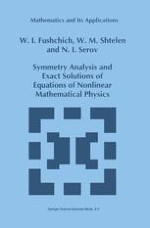by spin or (spin s = 1/2) field equations is emphasized because their solutions can be used for constructing solutions of other field equations insofar as fields with any spin may be constructed from spin s = 1/2 fields. A brief account of the main ideas of the book is presented in the Introduction. The book is largely based on the authors' works [55-109, 176-189, 13-16, 7*-14*,23*, 24*] carried out in the Institute of Mathematics, Academy of Sciences of the Ukraine. References to other sources is not intended to imply completeness. As a rule, only those works used directly are cited. The authors wish to express their gratitude to Academician Yu.A. Mitropoi sky, and to Academician of Academy of Sciences of the Ukraine O.S. Parasyuk, for basic support and stimulation over the course of many years; to our cowork ers in the Department of Applied Studies, LA. Egorchenko, R.Z. Zhdanov, A.G. Nikitin, LV. Revenko, V.L Lagno, and I.M. Tsifra for assistance with the manuscript.
